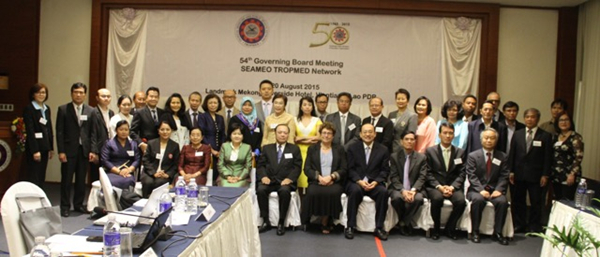
On 19-20 August 2015, ASEAN-China Centre (ACC) participated in “SEAMEO TROPMED Network 54th Governing Board Meeting” and thematic Symposium on “Outbreak Management of Emerging Health Issues” upon invitation by the Secretary-General/Coordinator of the SEAMEO TROPMED (Southeast Asian Minister of Education Organization Tropical Medicine) in Vientiane, Laos. The Meeting was officially opened by H.E. Mr. Somock Kingsada, Vice Minister of Health from Laos, and attended by around 50 participants from the Governing Board members of Brunei, Cambodia, Laos, Malaysia, Myanmar, the Philippines, Singapore,Thailand and Viet Nam, World Health Organization (WHO) representative Dr. Juliet Leischl as well as other health experts from international research centres and universities such as University of the Ryukyus and Teikyo University. ACC delegation was Director of Education Culture and Tourism Division (ECTD) Mr. Tri Purnajaya and Mr. Peng Qizhong.
Vice Minister Kingsada warmly welcomed all the participants and was hopeful that the Meeting would provide useful recommendations for SEAMEO TROPMED in moving forward and contribute ideas to overcoming the challenges in the region, especially in health related issues and the need for more collaborative approach and education to overcome those challenges. The Governing Board Meeting discussed the reports and accomplishments of TROPMED offices from member countries. The Meeting also deliberated on potential activities and projects to highlight the 50th anniversary of SEAMEO TROPMED which would take place in 2016.
Director Purnajaya elaborated on ACC’s roles and functions as an inter-governmental organization between China and ASEAN countries in the five areas of cooperation; namely, education, culture, tourism, trade and investment, and appreciated SEAMEO TROPMED’s interests to develop its links with the Chinese institutions through the support of ACC. ACC delegation also attended the Symposium and presentation by WHO expert, Dr. Jennie Musto and discussed ways to tackle emerging health issues such as pandemic diseases and the importance of regional and joint response.